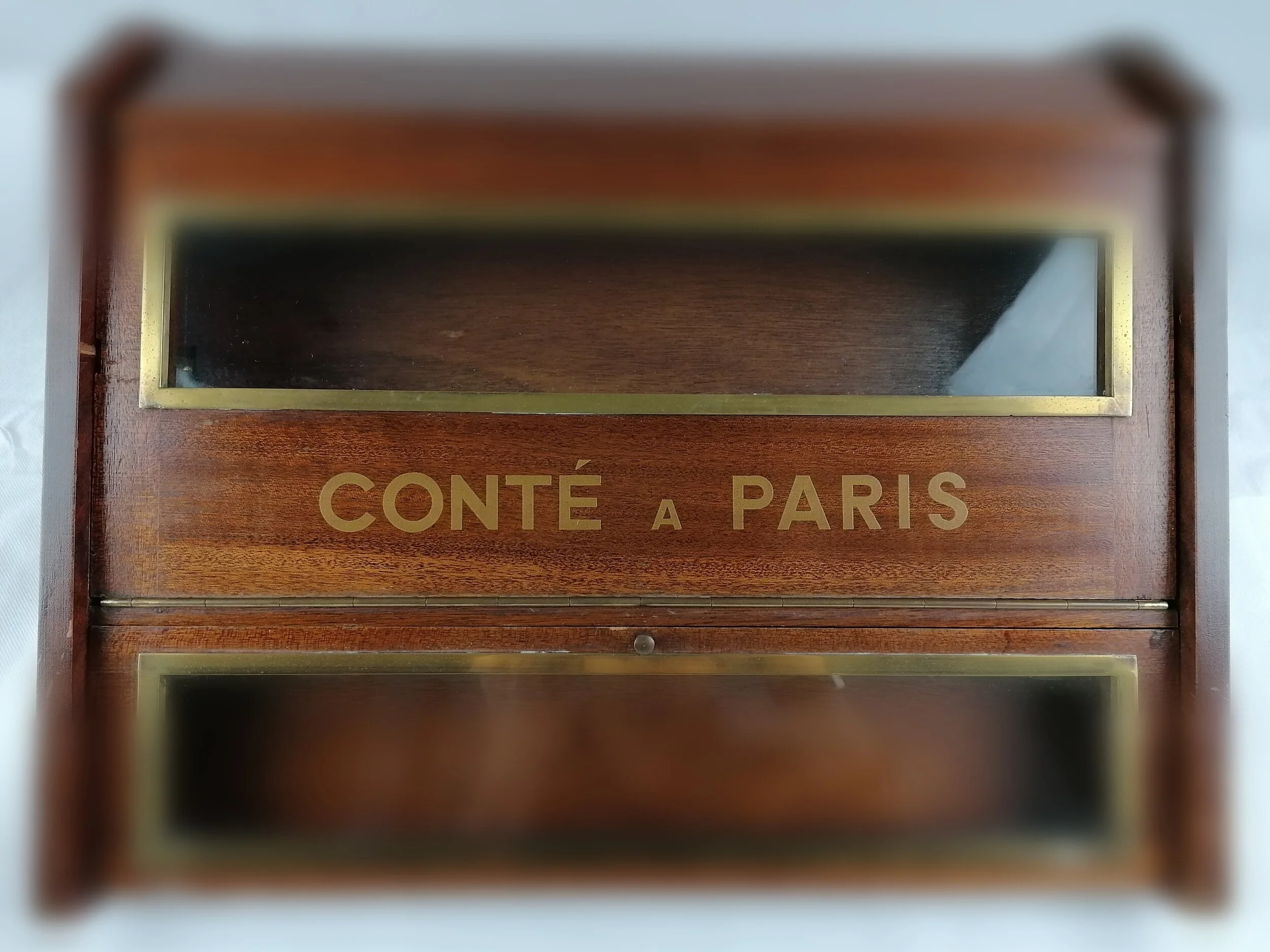1950's Conte A Paris Pencils & Pastels Shop Display Case
1950s Conte A Paris shop-counter display case for pencils and pastels.
Wood construction with brass framed windows. Measures H 23.5cm x W 45cm wide x D 45cm. Condition: Very good. Solid construction with some wear.
There is no doubting the purpose of this beautiful and innovative shop display case - to present the finest drawing materials in the world to the most discerning customers. This case has been cleverly designed to reveal the full range of pencils and pastels to the customer in a small area whilst holding the products in place in their respective compartments as the case is opened via its many doors and draw.
Conte was founded by Nicolas Conte, inventor of the modern pencil. Born in 1755, Nicolas claimed the title of painter, chemist, physicist, hot air baloonist and inventor during the fifty years of his life. His historical achievement is undeniable. In 1794, he developed the modern graphite lead from a mixture of clay and graphite, thus making it finally possible to create different hardness grades for pencils. The pencil factory he set up in 1795, enabled France to produce its own calligraphy and drawing materials.
A few years later, he developed “pencils without sleeves” (bare leads) replacing those made from “Italian stone”. He worked on making the colours “fixed and unchangeable” to meet the requirements of the painters of the day. Artists’ pencils and pastels were born.
FREE UK DELIVERY. Non-UK Delivery available, please request a quotation
1950s Conte A Paris shop-counter display case for pencils and pastels.
Wood construction with brass framed windows. Measures H 23.5cm x W 45cm wide x D 45cm. Condition: Very good. Solid construction with some wear.
There is no doubting the purpose of this beautiful and innovative shop display case - to present the finest drawing materials in the world to the most discerning customers. This case has been cleverly designed to reveal the full range of pencils and pastels to the customer in a small area whilst holding the products in place in their respective compartments as the case is opened via its many doors and draw.
Conte was founded by Nicolas Conte, inventor of the modern pencil. Born in 1755, Nicolas claimed the title of painter, chemist, physicist, hot air baloonist and inventor during the fifty years of his life. His historical achievement is undeniable. In 1794, he developed the modern graphite lead from a mixture of clay and graphite, thus making it finally possible to create different hardness grades for pencils. The pencil factory he set up in 1795, enabled France to produce its own calligraphy and drawing materials.
A few years later, he developed “pencils without sleeves” (bare leads) replacing those made from “Italian stone”. He worked on making the colours “fixed and unchangeable” to meet the requirements of the painters of the day. Artists’ pencils and pastels were born.
FREE UK DELIVERY. Non-UK Delivery available, please request a quotation
1950s Conte A Paris shop-counter display case for pencils and pastels.
Wood construction with brass framed windows. Measures H 23.5cm x W 45cm wide x D 45cm. Condition: Very good. Solid construction with some wear.
There is no doubting the purpose of this beautiful and innovative shop display case - to present the finest drawing materials in the world to the most discerning customers. This case has been cleverly designed to reveal the full range of pencils and pastels to the customer in a small area whilst holding the products in place in their respective compartments as the case is opened via its many doors and draw.
Conte was founded by Nicolas Conte, inventor of the modern pencil. Born in 1755, Nicolas claimed the title of painter, chemist, physicist, hot air baloonist and inventor during the fifty years of his life. His historical achievement is undeniable. In 1794, he developed the modern graphite lead from a mixture of clay and graphite, thus making it finally possible to create different hardness grades for pencils. The pencil factory he set up in 1795, enabled France to produce its own calligraphy and drawing materials.
A few years later, he developed “pencils without sleeves” (bare leads) replacing those made from “Italian stone”. He worked on making the colours “fixed and unchangeable” to meet the requirements of the painters of the day. Artists’ pencils and pastels were born.
FREE UK DELIVERY. Non-UK Delivery available, please request a quotation















